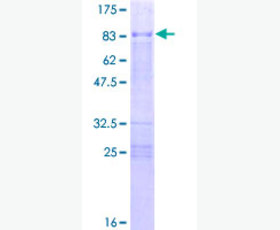Recombinant Human Cell Adhesion Molecule 3/CADM3/IGSF4B/SynCAM3
| Product name: | Recombinant Human Cell Adhesion Molecule 3/CADM3/IGSF4B/SynCAM3 |
| Source: | Human Cells |
| Purity: | Greater than 95% as determined by reducing SDS-PAGE. |
| Buffer Formulation: | Lyophilized from a 0.2 μm filtered solution of 20mM PB, 150mM NaCl, pH 7.2. |
| Applications: | Applications:SDS-PAGE; WB; ELISA; IP. |
| Storage: | Avoid repeated freeze/thaw cycles. Store at 2-8 oC for one month. Aliquot and store at -80 oC for 12 months. |
| UOM: | 100ug/50ug/200ug/1mg/1g |
| Source | Human Cells |
| Description | Recombinant Human Cell Adhesion Molecule 3 is produced by our Mammalian expression system and the target gene encoding Asn25-His330 is expressed with a 6His tag at the C-terminus. |
| Names | Cell Adhesion Molecule 3, Brain Immunoglobulin Receptor, Immunoglobulin Superfamily Member 4B, IgSF4B, Nectin-Like Protein 1, NECL-1, Synaptic Cell Adhesion Molecule 3, SynCAM3, TSLC1-Like Protein 1, TSLL1, CADM3, IGSF4B, NECL1, SYNCAM3, TSLL1 |
| Accession # | Q8N126 |
| Formulation | Lyophilized from a 0.2 μm filtered solution of 20mM PB, 150mM NaCl, pH 7.2. |
| Shipping |
The product is shipped at ambient temperature. |
| Reconstitution |
Always centrifuge tubes before opening. Do not mix by vortex or pipetting. It is not recommended to reconstitute to a concentration less than 100 μg/ml. Dissolve the lyophilized protein in ddH2O. Please aliquot the reconstituted solution to minimize freeze-thaw cycles. |
| Storage |
Lyophilized protein should be stored at < -20°C, though stable at room temperature for 3 weeks. Reconstituted protein solution can be stored at 4-7°C for 2-7 days. Aliquots of reconstituted samples are stable at < -20°C for 3 months. |
| Purity |
Greater than 95% as determined by reducing SDS-PAGE. |
| Endotoxin | Less than 0.1 ng/µg (1 IEU/µg) as determined by LAL test. |
| Amino Acid Sequence |
NLSQDDSQPWTSDETVVAGGTVVLKCQVKDHEDSSLQWSNPAQQTLYFGEKRALRDNRIQLVTST PHELSISISNVALADEGEYTCSIFTMPVRTAKSLVTVLGIPQKPIITGYKSSLREKDTATLNCQS SGSKPAARLTWRKGDQELHGEPTRIQEDPNGKTFTVSSSVTFQVTREDDGASIVCSVNHESLKGA DRSTSQRIEVLYTPTAMIRPDPPHPREGQKLLLHCEGRGNPVPQQYLWEKEGSVPPLKMTQESAL IFPFLNKSDSGTYGCTATSNMGSYKAYYTLNVNDPSPVPSSSSTYHVDHHHHHH
|
| Background | Cell Adhesion Molecular Proteins are proteins located on the cell surface involved with the binding with other cells or with the extracellular matrix in the cell adhesion process. These proteins consists of three domains, an transmembrane domain, an intracellular domain that interacts with the cytoskeleton, and an extracellular domain that interacts with other CAMs of the same kind or with other CAMs or the extracellular matrix. Cell Adhesion Molecular 3 (CADM3) is a neural tissue-specific member of the nectin-like family of immunoglobulin superfamily. CADM3 interacts with EPB41L1 may regulate structure or function of cell-cell junctions. CADM3 has both calcium-independent homophilic cell-cell adhesion activity and calcium-independent heterophilic cell-cell adhesion activity with IGSF4, PVRL1 and PVRL3. |














